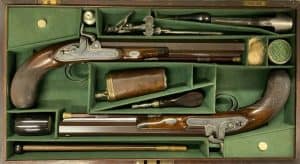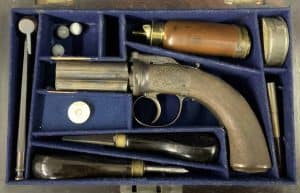Description
Japanese Matchlock Musket
Japanese Matchlock Musket. A very ornate Japanese matchlock musket with beautifully inlaid barrel. In lovely condition and in full working order. Measuring 53” long and weighing 9lb. Ramrod missing
Tanegashima, most often called in Japanese and sometimes in English hinawajū (“matchlock gun”), was a type of matchlock-configured arquebus firearm introduced to Japan through the Portuguese Empire in 1543. Tanegashima were used by the samurai class and their ashigaru “foot soldiers”, and within a few years the introduction of the tanegashima in battle changed the way war was fought in Japan forever.
The tanegashima seems to have been based on snap matchlocks that were produced in Portuguese Malacca, at the armory of Malacca, a colony of Portugal since 1511, called an istinggar in Malay. The name tanegashima came from the Japanese island (Tanegashima) where a Chinese junk with Portuguese adventurers on board was driven to anchor by a storm in 1543. The lord of the Japanese island, Tanegashima Tokitaka (1528–1579), purchased two matchlock muskets from the Portuguese and put a swordsmith to work copying the matchlock barrel and firing mechanism. The smith, Yaita, did not have much of a problem with most of the gun but “drilling the barrel helically so that the screw (bisen bolt) could be tightly inserted” was a major problem as this “technique did not apparently exist in Japan until this time.” The Portuguese fixed their ship and left the island and only in the next year when a Portuguese blacksmith was brought back to Japan was the problem solved. Within ten years of its introduction, over 300,000 tanegashima firearms were reported to have been manufactured.
Click here for more Japanese items











